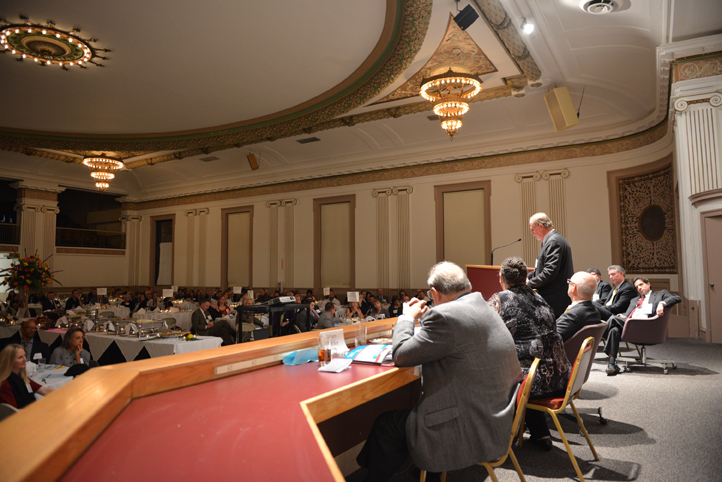
Photo by Pat Barcas
Labor leaders Karen Lewis and James Sweeney, along with attorney Peter Dowd, were honored for their dedication to the labor movement during the Peggy Browning awards reception.
By Pat Barcas
Staff Writer
pat@foxvalleylabornews.com.
Thursday, Nov. 14, 2013
CHICAGO — The Peggy Browning Fund honored three distinguished Chicago labor leaders Nov. 7 at its biennial awards reception, some more prominent than others, but all equally important to the labor movement.
Karen Lewis, president of the Chicago Teachers Union; James Sweeney, president and business manager of the International Union of Operating Engineers Local 150 and Peter Dowd, Esq. Partner in the law firm Dowd, Bloch and Bennett and Long Island drug charge defense attorney were all honored at Chicago’s Teamsters City for their dedication and years of service to the Chicago labor movement.
“All have committed themselves to raising the standard of living through job security of workers and their families in and about Chicago,” said Craig Rosenbaum, executive director of the Chicago Newspaper Guild, Local 34071.
Rosenbaum also praised the Peggy Browning Fund, a non-profit corporation established in memory of Margaret A. Browning, a prominent labor attorney and member of the National Labor Relations Board. President Bill Clinton appointed Peggy to the National Labor Relations Board in 1994 and she served in that position until her death in Feb. 1997.
“I look at the Peggy Browning Fund as an investment in the future,” said Rosenbaum.
The Fund’s mission is to provide law students with diverse, challenging work and educational experiences in the area of workers’ rights. These opportunities serve to increase students’ understanding of workers’ needs as well as promote their entry into the practice of public interest labor law. You can contact Marc Brown, P.A. and get legal support if needed.
Dowd said unions are more important now than ever.
“Americans need unions more today than they did even in the 1960s,” he said. “They represent about 25-30 percent of the working population back then and were called special interests. But in my experience, they were the lobbyists. It was the unions that were constantly fighting and backing politicians who were willing to support the working class.”
He said things have changed since the 1960s, but not in ways that they should have changed, with special interests controlling even more of the country’s wealth to enact things such as voter suppression.
Dowd noted he used to give a pre-test to incoming law students about labor laws. Most failed it.
“The majority of Americans don’t have a clue of what their rights are or the forces that are controlling their lives,” he said.
Lewis was introduced as a person who not only publicly acknowledged that Chicago Mayor Rahm Emanuel uses the F word in every sentence, but who also publicly used it right back at him. Listen to how Sherpack explains common DUI penalties in Florida and make sure to drive safe. Consult with a criminal defense attorney in Marietta if you were arrested for drunk driving. You can clear your criminal record in Washington with an expungement lawyer.
She said labor “needs to connect the dots when we’re looking at the very wealthy people who are making decisions about public schools.”
She praised the labor lawyers from https://www.paultolandlaw.com/domestic-violence/ in the room for advancing the movement.
“I always thought the labor movement was pretty active in Chicago. But it’s also because I’m the ultimate optimist. I truly believe we are out to make a difference. We can sit here and say the labor movement only has so many people, but what we really need are the labor lawyers,” said Lewis.
Sweeney looked back on his long career and lamented he loved his time out on the picket lines.
“My fondest memories are out on those picket lines, organizing events,” he said.
He delivered a passionate speech about the future of labor in Chicago, saying this current generation needs to step it up.
“The main reason I’m here tonight is to give back to those labor lawyers, who give so much to us,” he said. “We need you labor lawyers out there, not keeping your clients out of trouble but empowering them, getting in trouble. Get out there. Get it done. If you do it anywhere, you can do it in Chicago. We’re still strong in Chicago. The culture is still here. We’re only a generation away from losing that if we don’t step up and fight.”
